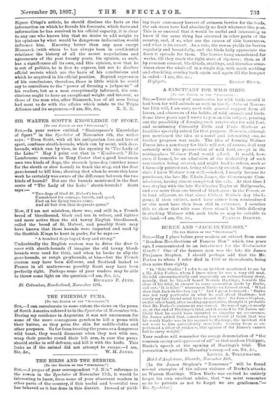BURKE AND " JACK-TN-THE-BOX."
[TO THE EDITOR Or THE " SPECTATOR:1 Sin,—May I place before your readers an extract from some "Random Recollections of Famous Men" which, two years ago, I communicated to an interviewer for the Westminster
Gazette ? One of the famous men was the late Sir James Fitzjames Stephen. I should perhaps add that the Mr. Forbes to whom I refer died in EGO or thereabouts, being then more than eighty.
" In Safe Studies' I refer to an incident mentioned to me by a Mr. John Forbes, whom I knew when he was a very old man. He told circumstantially and repeatedly an extraordinary story, namely, that he himself heard Warren Hastings, towards the close of his trial, in answer to some accusation made by Burke, call out, 'It is false !' whereupon Burke exclaimed aloud, What does that Jack-in-the-box say ? ' And I go on to remark : Burke was not very particular in what he said about Hastings; but surely my late friend must have dreamt this.' Sir James Stephen, on the other hand, after reading my narrative, thought it probable that Mr. Forbes's statement was correct. He was of age, or nearly so, at the end of Hastings's trial, and it seemed to Sir James un- likely that he could have invented so singular an occurrence. Sir James added that, considering how brutal (I think that was his word) Burke was in his manner to Hastings, the incident did not seem to him antecedently incredible. Coining from so ex- perienced a sifter of evidence, this opinion of Sir James's cannot fail to carry weight."
Your readers will remember the savage denunciation of "the common enemy and oppressor of all" in that modern Philippic,
Barke's speech at the opening of Hastings's trial. The peroration is quoted in Macanlay's essay.—I am, Sir, &c.,
LIONEL A. TOLLEMACHE.
Hotel d'Angleterre, Biarritz, November 15th.
[In Sir James Stephen's " Nuncomar " will be found several examples of the odious violence of Bnrke's attacks on Warren Hastings. When Burke was excited he entirely forgot his own excellent advice, that "we must remember so to be patriots as not to forget we are gentlemen."— ED. Spectator.]






















































 Previous page
Previous page